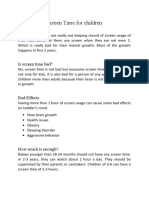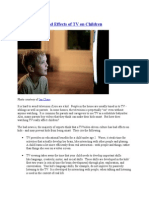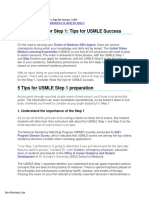Report Writing - Insert
Read the passage carefully, and then answer Question 1 on the Question Paper.
In this article from an online website called ‘Digital Trends’, the writer discusses how much time young
people should spend looking at screens.
Are screens scrambling our kids’ brains?
Most of us adults would probably admit that we spend too much time staring at screens. It’s not unusual
to reach for our smartphones first thing in the morning, spend all day in front of a computer monitor,
and then relax by collapsing in front of the TV. Sometimes, we even browse on a smaller screen
while watching a bigger one. It’s not just a chore either – we enjoy our gadgets. Screens aren’t just
for entertainment anymore: we use them to communicate, to shop, to share. In fact, we use them for
everything.
Children are learning to use them for everything, too. In the UK, kids aged between five and sixteen
spend an average of six and a half hours per day in front of a screen, according to the Connected
Kids Report. In the USA, it’s a similar story, with children between the ages of 8 and 18 averaging
around 7 hours per day with some form of media, according to the Kaiser Family Foundation. The
American Academy of Paediatrics recommends that entertainment screen time, as opposed to other
ways of using screens, is limited to one or two hours per day, and that children under two years of age
shouldn’t have any screen time at all.
‘That recommendation came out 25 years ago, and it was based on a study of obesity in children,’
explained Dr Victor Strasburger, professor of paediatrics at the University of New Mexico. ‘Since that
time, we’ve seen the rise of iPads and smartphones and Internet access for all.’
A lot has happened in 25 years.
The two hour recommendation hasn’t changed, but kids today are spending more time than ever with
screens and using them for more activities. A concern that was initially about the physical risks of being
sedentary in front of the TV for hours has now grown to include the potential mental impact of exposure
to all those screens.
It’s long been an accepted wisdom that too much time spent sitting in front of the TV is bad for us. It
may not lead to square eyes, as our parents told us, but it is strongly linked to obesity in adults and
children. TV viewing has also been linked with disruptions to sleep; one hour of TV viewing per day
for kids can shorten sleep by seven minutes per day. For babies under the age of two, there’s strong
evidence that screen viewing has a negative effect on language development.
Exposure to the wrong kinds of media could also contribute to a range of serious disorders beyond sleep
deprivation and delayed development. Increased levels of aggression and anxiety related to exposure
to material which is not appropriate for a child’s age and development can also occur. Conversely,
children can become dependent and passive. Children and young adults are much more likely to be
influenced by media than older adults. ‘Adults can make reasoned decisions, which adolescents can’t
always do,’ explains Dr Strasburger. ‘The last part of your brain to develop deals with judgement,
decision-making, and impulse control and it doesn’t fully mature until around the age of 25.’
Many parents will make the argument that they watched hours of TV every day while growing up and
they turned out fine, but content and access has changed. Kids today can potentially see whatever
they want, whenever they want, and can stumble on inappropriate content accidentally, unlike those in
previous generations.
‘Many parents are clueless,’ says Dr Strasburger. ‘There’s plenty of good content out there, but you
can’t trust that your kids will find it.’ Dr Strasburger is quick to point out that entertainment and media
are not inherently harmful. Some content, for example, can help teach kids letters and numbers. It’s
not necessarily screen time itself that’s the problem, but rather the content that’s being consumed and
© UCLES 2019 0990/31/INSERT/M/J/19
� 3
the environment it’s being consumed in. ‘Watching with parents can be good, but only if they talk about
what’s happening onscreen. Just being in the same room is not enough.’
The research suggests that positive parental influences will still outweigh the media. The wrong
videogame, music, or movie is not going to turn a good kid bad, but a constant stream of violence for a
prolonged period could have an impact.
When you factor in school, playing, clubs, and meals, it’s not too difficult to limit screen time to that
all-important two hours, but weekends are a different matter. Keeping TVs and other devices out of
kids’ bedrooms is really important. If technology is in their bedroom, they’ll use it more, and without
supervision. It’s also vital to take an interest in what they’re watching or playing. There’s no doubt that
it’s tough to restrict screen time for children in the modern world, particularly when many of us adults
are spending so much time with screens ourselves, but it’s something you need to think about early.
Changing older kids’ habits isn’t easy.
‘If you have a teen who plays first-person shooters five hours a day, then good luck,’ says Dr
Strasburger. ‘You really have to start from the beginning. If you limit screen time from an early age,
then your kids will get into healthy habits.’
Report Writing
Read carefully the passage and then answer Question 1.
Question 1
Your school has decided to provide laptop to individual student in class. You are asked to write a report
about the effects of screentime on children. Write your report.
In your report, you should:
••evaluate the different arguments given in the article
••explain how far you agree or disagree with the views in the article about the dangers and the
benefits of time spent by young people in front of a screen.
Base your report on what you have read in the article, but be careful to use your own words.
Address each of the bullet points.
Write about 250 to 350 words.
Up to 10 marks are available for the content of your answer, and up to 15 marks for the
quality of your writing.
© UCLES 2019 0990/31/INSERT/M/J/19






































































































